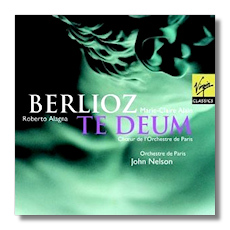
The Internet's Premier Classical Music Source
Related Links
- Berlioz Reviews
- Latest Reviews
- More Reviews
-
By Composer
-
Collections
DVD & Blu-ray
Books
Concert Reviews
Articles/Interviews
Software
Audio
Search Amazon
Recommended Links
Site News
 CD Review
CD Review
Hector Berlioz

Te Deum, Op. 22
Roberto Alagna, tenor
Marie-Claire Alain, organ
Choeur De L'Orchestre De Paris
Choeur D'Enfants De L'Union Européene
Orchestre de Paris/John Nelson
Virgin Classics 45449 DDD 57:40
Berlioz scored one of his major successes with the Te Deum. Most writers on the composer consider it the best of his "monumental" works. Certainly, it's the most conventional. I find myself a bit out of step. I like the work quite a bit, but I prefer the wilder and woollier Berlioz of the Requiem and the Grande Symphonie funébre et triomphale. The Te Deum has a curious history. Berlioz composed the six choral movements. Then, deciding it wasn't quite grand enough, added an instrumental "Prelude" and a "March before the Presentation of the Colors." Almost everyone omits these later movements. This recording, as far as I know the only one, presents the Te Deum in its entirety. I find the additions well worth hearing, even illuminating. They make you realize Berlioz's links to the French music of his time – to the French Empire ceremonial wind-and-percussion pieces of composers like Gossec. In a sense, even in these minor works, Berlioz takes the genre further than his predecessors or contemporaries.
Berlioz's original conception called for a mere two choirs and large orchestra. However, an encounter with a performance of Bach's St. Matthew Passion inspired him to add a third chorus, and his concern for contrasting vocal and instrumental colors (as well as hearing a London charity children's choir) prompted him to specify that the third chorus consist of children. From the first, Berlioz wants to impress you and succeeds, not just with grandness but with academic counterpoint. There's always a clunky, home-made quality to Berlioz's academic counterpoint: a whiff of homework clings to it. It's almost as if he thinks too strongly in terms of harmony and chorale, where everything marches in lockstep and the "counterpoint" consists of filigree on the harmonic idea. His mastery shows in an expanded view of counterpoint: the idea of simultaneous activity, rather than fugue and canon, such as one finds at the end of the "Tu, Christe, Rex gloriae" movement.
I get my jollies mostly from the instrumental and choral colors, as well as from the astonishing, unexpected chord progressions (even the relatively mild one at "pleni sunt coeli") that pepper the work and the asymmetrical melodic phrasing that sounds both odd and right at the same time. I can and do admire Beethoven enormously, but years of experience have robbed his music of the power to surprise me. I can't go back to the time when Beethoven's Fifth counted as undiscovered country. Berlioz's music still gives me the little unexpected jolt. It remains, at even the surface, mysterious. I recently took part in performances of the Missa Solemnis and Romèo et Juliette. The Beethoven was the more complex work musically, but the Berlioz was harder for performers to grasp. The parts simply didn't move the way we expected, possibly because Beethoven has sunk deeper into our musical culture than Berlioz has.
I like the "Judex crederis" movement best, from its blaring open fifths at the start, to the swinging counterpoint of the choral opening, to its harmonic ambiguity throughout. It reminds me a little of the grand guignol howling "Lachrymosa" in the Requiem.
This is probably the best performance of the work I've heard. Abbado's live DG recording had some great moments, particularly the quieter ones, but the account as a whole strikes with less sheer force than Nelson's. Abbado scores over Nelson in the tenor solo, "Te ergo quaesimus," both with a better tenor (Francisco Araiza) and a more elegant and varied way with a phrase. Alagna does the standard contemporary version of Italian Tenor, as if someone is squeezing him until his eyeballs bulge. Subtlety ain't his strong point, and he sounds, unfortunately, like many other operatic tenors, with, unfortunately, the same level of musicianship. On the other hand, Araiza could probably do a credible job with mèlodie and Lieder. Yet Alagna has the career, for some reason.
Still, Nelson does everything else much better. The choirs are clearer with electrifying attacks and superbly clear diction. Everything has more glitz and oomph, exactly right for this Berlioz. Nelson shakes the Victorian cobwebs from the work and presents something far more audacious than what they customarily hand us. My one complaint (other than Alagna, who does okay if you haven't heard anyone better) is with the placement of the "March" after the "Judex crederis," which ends so gloriously, almost anything else seems anti-climactic. You can solve this, however, simply by reprogramming your CD player. I like it before the "Judex." It makes a nice transition from the lyrical tenor solo to the grand (and I do mean grand) finale.
The recorded sound is very bright, almost in your face. I think it works well for this piece.
Copyright © 2008, Steve Schwartz




















